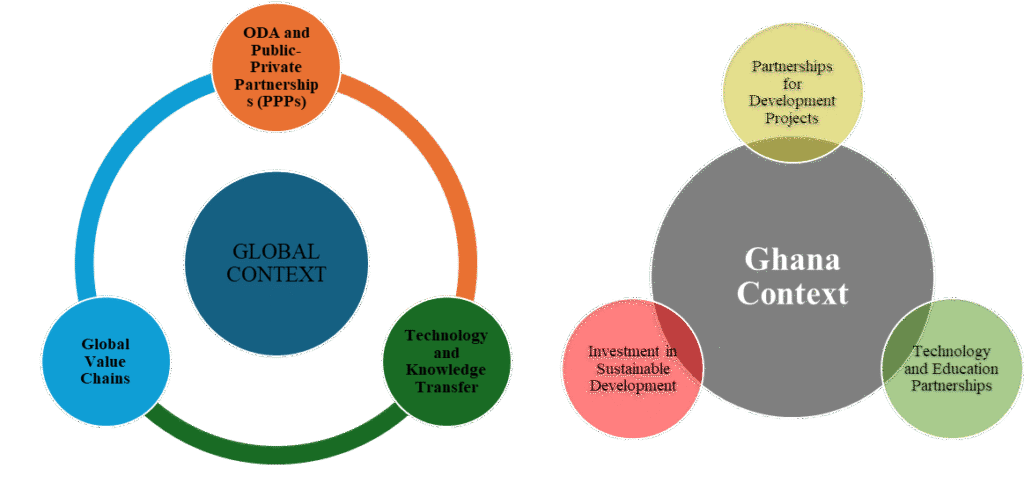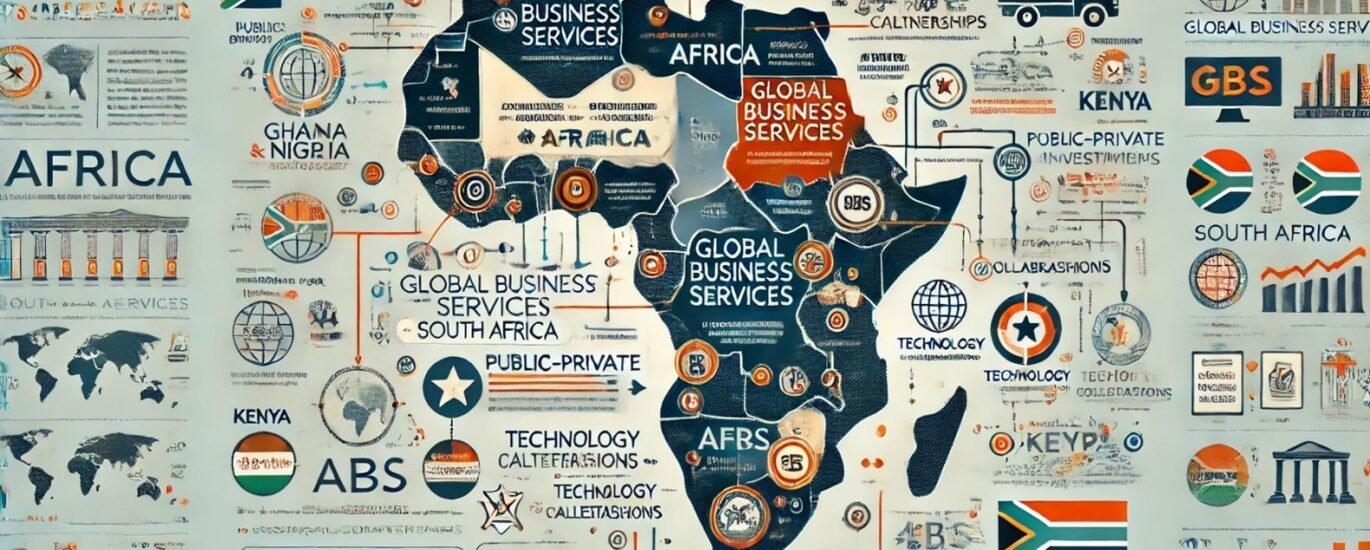Global Business Services (GBS) has become a significant driver of economic growth, job creation, and diversification. This article explores the theme of Collaboration for Success, emphasizing the importance of public-private partnerships, the role of educational institutions, the need for infrastructure investment, and the call for collective efforts to unlock Ghana’s GBS potential.
Importance of Public-Private Partnerships for GBS Development
Public-private partnerships (PPPs) are essential for the development of GBS ecosystems. They enable collaboration between government entities and private companies, facilitating the financing, building, and operation of crucial projects. Globally, PPPs have been instrumental in delivering infrastructure and services efficiently, leveraging private sector innovation and technology alongside public sector incentives (World Bank, 2021).
In Ghana, the GBS sector can benefit significantly from PPPs. For instance, the country aims to boost job growth in the GBS sector, which is projected to contribute substantially to the economy (GIZ, 2023). The continuous support for GBS development across Africa underscores the potential of PPPs to enhance service delivery and operational efficiency, ultimately leading to improved economic outcomes
Role of Educational Institutions in Developing a Skilled GBS Workforce
Educational institutions are pivotal in preparing a skilled workforce for the GBS sector. They can bridge the gap between academic training and industry requirements through partnerships with businesses. By offering vocational courses, internships, and practical learning opportunities, educational institutions can equip students with the necessary skills to thrive in the GBS landscape.
Statistics indicate that by 2025, about half of all workers will need to learn new skills, which could add approximately $11.5 trillion to global GDP by 2028 if the skills gap is closed. This highlights the urgent need for educational institutions to adapt their curricula to meet the evolving demands of the job market. In Ghana, fostering collaborations between universities and GBS firms can ensure that graduates are well-prepared to enter the workforce, thus enhancing the overall competitiveness of the sector.
Need for Infrastructure Investment and Policy Improvements
Investment in infrastructure is crucial for attracting GBS businesses. Globally, it is estimated that around $3.3 trillion annually is needed to support economic growth through infrastructure development (OECD, 2022). In Ghana, significant investment in physical assets such as roads, telecommunications, and utilities are necessary to create a conducive environment for GBS operations.
Moreover, policy improvements are essential to streamline processes and reduce barriers for GBS companies. By creating a favorable regulatory framework, Ghana can enhance its attractiveness as a destination for GBS investments. This includes simplifying business registration processes, providing tax incentives, and ensuring a stable economic environment to foster growth in the sector
Partnerships for Goals:
Global partnerships have been instrumental in advancing economic development, particularly within the framework of the United Nations Sustainable Development Goals (SDGs). SDG 17, “Partnerships for the Goals,” emphasizes the importance of collaboration among governments, the private sector, civil society, and international organizations to achieve sustainability
development outcomes.
The Global Context:
ODA and Public-Private Partnerships (PPPs): In 2022, Official Development Assistance (ODA) from members of the OECD’s Development Assistance Committee (DAC) reached $204 billion, marking a 13.5% increase from 2021. These funds have been crucial in supporting development projects through partnerships (OECD, 2023).
The global market for Public-Private Partnerships (PPPs) in infrastructure is expected to reach $3.9 trillion by 2025, reflecting the growing importance of collaboration between the public and private sectors in achieving sustainable development (World Bank, 2022).
Technology and Knowledge Transfer: Partnerships between countries and technology companies have led to significant advancements in technology transfer. For example, through collaborative initiatives, over 1.5 billion people globally gained access to the internet from 2010 to 2020, expanding opportunities for digital inclusion and economic development (International Telecommunication Union, 2021).
Global Value Chains: Partnerships have also played a vital role in integrating developing countries into global value chains (GVCs). By 2023, it was estimated that developing countries’ participation in GVCs accounted for 40% of global trade, up from 30% in 2000. This growth has been driven by international partnerships and investments in local industries (World Trade Organization, 2023).
Ghanaian Context:
Partnerships for goals, particularly under SDG 17, are critical for achieving sustainable development. Globally and in Ghana, these partnerships have driven significant progress in infrastructure, technology, education, and economic integration. By continuing to strengthen these collaborations, countries can accelerate their development efforts and achieve the SDGs by 2030. Below are some general insights to consider.
Partnerships for Development Projects: In Ghana, international partnerships have been pivotal in infrastructure development. For example, through collaborations with the World Bank and the African Development Bank (AfDB), Ghana has secured over $3.5 billion in funding for energy, transportation, and healthcare projects since 2015 (African Development Bank, 2023).
PPPs in Ghana have also been instrumental in improving public services. The Ghana National Petroleum Corporation (GNPC) has partnered with private companies to enhance oil and gas infrastructure, contributing significantly to the country’s GDP growth (GIPC, 2023).
Technology and Education Partnerships: Ghana has benefited from partnerships in the education sector, particularly through initiatives like the Ghana-India Kofi Annan Centre of Excellence in ICT. Such partnerships have provided training to over 20,000 students and professionals in ICT, boosting the country’s capacity in the tech industry (Ministry of Education, Ghana, 2023).
Collaboration between the government and international organizations has led to the expansion of e-governance services, with over 200 government services now available online, improving accessibility and efficiency (World Bank, 2023).
Investment in Sustainable Development: Ghana’s commitment to sustainable development through partnerships is evident in the implementation of the Sustainable Development Investment Partnership (SDIP). Through this initiative, Ghana has attracted over $500 million in investments for sustainable energy projects, contributing to the country’s goal of achieving universal access to electricity by 2030 (SDIP, 2023).

figure 1.1 showing the global context and Ghanaian context related to partnerships for goals
Conclusion: A Collective Effort to Unlock Ghana’s GBS Potential
To fully realize Ghana’s potential in the GBS sector, a collective effort is required from all stakeholders, including government, private sector, and educational institutions. By fostering public-private partnerships, enhancing educational curricula, and investing in infrastructure, Ghana can position itself as a leading hub for GBS in Africa.
The collaboration of these entities will not only drive economic growth but also create sustainable job opportunities, contributing to the overall development of the nation. It is imperative that all stakeholders come together to build a thriving GBS ecosystem that leverages Ghana’s unique strengths and capabilities.
ABOUT THE AUTHOR
Abraham Fiifi Selby is a Postgraduate Student at the University College London, School of Public Policy in United Kingdom and Digital Analyst and IT researcher by profession, member with esteemed organizations such as the Internet Society (Ghana Chapter), ICANN, UN IGF, EGIGFA,, PAYAIG and IIPGH.
This Publication is written in author’s own capacity not affiliated with any of the membership organization.
Email: selby.abraham@selbyconsult.com or selby.abraham@live.com






